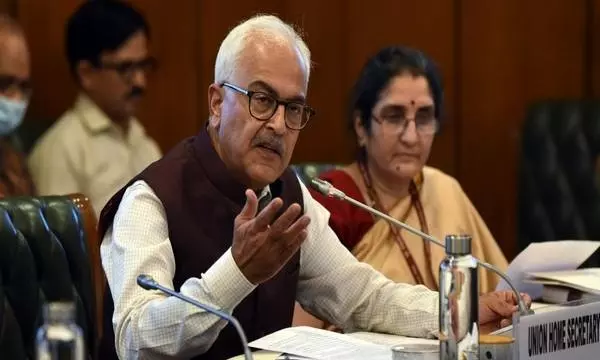
Former Union Home Secretary Ajay Kumar Bhalla (left). File photo: X/@ANI
Can Ajay Kumar Bhalla, as Governor, fix the Manipur issue? No easy task ahead
Bhalla’s biggest challenge is to restore people’s confidence in Central Armed Forces amidst a “bias” tag on them

When Ajay Kumar Bhalla, the country’s longest-serving home secretary, started his gubernatorial assignment on Friday (January 3), an economic blockade to protest alleged atrocities by security forces on women was underway at Kuki-Zo inhabited areas in Manipur. A tribal group also reportedly attacked the office of the superintendent of police, Kangpokpi, where a senior police officer reportedly sustained injuries in the attack.
Security experts say it's essential that the Central forces win back the trust of the warring communities, or else the ongoing conflict will snowball into a bigger crisis. Over 250 people died and around 60,000 became homeless in the ethnic conflict that broke out in May 2023.
Also Read: Is Bangladesh again becoming hub of anti-India activities?
Hence, Bhalla’s biggest challenge as Manipur Governor would be restoring people’s confidence in central armed forces amidst a “bias” tag on them, adding a new dimension to the state’s raging conflict.
The Kuki-Zo Council, which called for the blockade, threatened to intensify its protest if the administration failed to maintain the “sanctity” of the buffer zones-- neutral areas created to segregate territories inhabited by warring Meitei and Kuki communities.
24-hour shutdown called
The Committee on Tribal Unity (CoTU), another influential tribal body, simultaneously observed a 24-hour shutdown in Kuki-Zo dominated Kangpokpi district to protest “beating” of women by security forces in Saibol village on December 31. The committee was pressing for its demand to immediately withdraw central forces from Saibol, terming their presence as "unnecessary and provocative".
The tribal community’s uprising against central forces comes after law-enforcers allegedly resorted to baton- charge on women last Tuesday (December 31). Police claimed Kuki-Zo women were trying to “disrupt” the deployment of a combined force comprising Army, BSF and CRPF.
The Kuki-Zo community, even in November last year, questioned the action of the Armed Forces after 10 members of the community were gunned down in the state’s Jiribam district. The tribal bodies alleged that the Central Reserve Police Force (CRPF) conspired with the Manipur Police and Meitei armed groups to "treacherously” murder Kuki village volunteers.
The police, however, claimed that the ten were killed in a gunfight that ensued when they attacked a CRPF post and a police station in Jiribam.
Several weapons, including AK and INSAS assault rifles and a rocket-propelled grenade (RPG) launcher, were found along with 10 bodies from the area after the gunfight stopped. The December 31 incident further deepened it, opening a new fissure in the conflict-riddled state.
Trust deficit still there
The trust deficit further assumed significance as Meitei groups had earlier accused Central forces of siding with the Kukis. Even the Manipur state police had faceoffs with the central forces on more than one occasion.
In June 2023, soon after the ethnic conflict broke out between the Meitei and Kuki-Zo community, the Centre itself took the responsibility of maintaining law-and-order in the violence-hit hill areas while leaving it to the state police to secure the valleys. The unprecedented arrangement has not only failed to restore peace, but it has also created another flashpoint, with warring communities questioning the neutrality of the central forces.
“It has made the situation more complex," former deputy director general of India's Defense Intelligence Agency (DIA) Major General (retired) Gaganjit Singh told The Federal. "It's essential that the Central forces win back the trust of the warring communities, “ he said.

